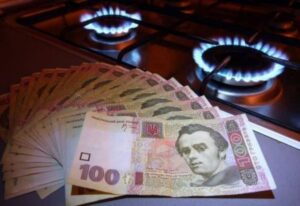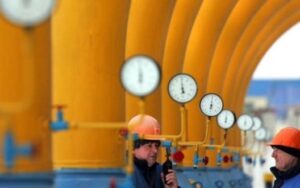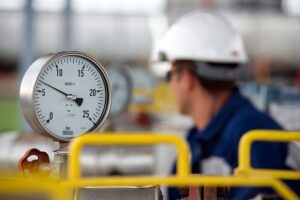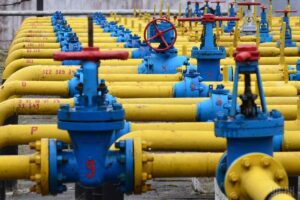
The price of the nearest (November) futures for TTF on the ICE Futures exchange on Wednesday afternoon reached 161 euros per MWh, or $1,924/1,000 cubic meters, according to exchange data.
Only this morning, the price of November futures topped $1,500/1,000 cubic meters.
All in all, the average value of the day-ahead contract at the TTF hub in the Netherlands, Europe’s main gas platform, was $759/1,000 cubic meters in September.
Europe, with a general shortage of gas supplies (by pipeline and in liquefied form), is being forced to compete for LNG with the premium Asian market.
Gas prices in Europe have recently had had an inextricable impact on Gazprom share prices.

Ukraine does not plan to negotiate with Russia to conclude a direct agreement for the supply of natural gas, Prime Minister of Ukraine Denys Shmyhal has said.
“Such negotiations are not planned,” he said in an interview to the lb.ua portal released on Tuesday.
The prime minister said that over 18.5 billion cubic meters of gas have already been accumulated in the underground storage facilities (UGS) of Ukraine [already 18.7 billion cubic meters], the country also has its own gas production, which will allow the coming heating season to pass.
According to him, one should not expect a significant re-export to the European market of gas owned by foreign traders, which is stored in the Ukrainian underground storage facilities.
“In any case, the first proposal is always made to Ukraine. With a probability of 100%, gas that is in Ukraine will be used here,” Shmyhal said.
The Ukrainian authorities will seek to maintain gas transit through the Ukrainian GTS in the future. “Surely, we will insist on maintaining the current level of transit for at least 15 years,” the head of government said.
According to JSC Ukrtransgaz, as of October 1, 2021, foreign service customers store 2.8 billion cubic meters of gas in the customs warehouse mode, while resident companies some 800 million cubic meters.

Similar to other European countries, Ukraine has declared its strive to complete shift to clean energy use. But on the way of the so-called “energy transition” natural gas will continue playing an important role for more than one decade – as a “transitional fuel”. In order not to be dependent on gas supplies, Ukraine has to increase its production, especially considering that the country has one of the largest gas reserves in Europe.
This and other important topics will be discussed at the Ukraine Gas Investment Congress, which starts on October, 20 in Kiev, involving business leaders from all around the world. On the eve of the Congress, Roman Abramovsky, Minister of Environmental Protection and Natural Resources of Ukraine, is telling about the situation in the industry and prospects in a blitz interview.
“The State is ready not only to support, but also to act as a guarantor of complex risky projects. And I would like our international partners and investors to hear this message,” emphasizes Mr.Abramovsky.
Roman Abramovsky, the Minister of Environmental Protection and Natural Resources of Ukraine
Our intention to reduce the environmental impact is in line with the European Green Deal. We consider Ukraine as a member of the European community. Therefore, we share its aspirations, values and standards.
Our ministry acts as an engine and mouthpiece of changes in the ecosystem. This year, we have prepared proposals to reduce national greenhouse gas emissions by 65% compared with 1990 by 2030. The green course will have an impact on all economy sectors, including energy, manufacturing, transport, utilities, agriculture, forestry and waste management.
In particular, for the energy sector, there is a goal to increase power generation from renewable sources (solar and wind). Their share in power generation should grow to 17% in 2030 and up to 25% in 2035, which is provided for in the energy strategy of Ukraine. Ukraine is already one of the European leaders in the development of green energy generation and potential for further growth is far from exhausted.
Now we are also actively discussing the huge prospects of Ukraine in the area of hydrogen production and transmission. Namely, Naftogaz of Ukraine is already planning the first pilot projects in cooperation with Germany’s RWE.
Along with the development of green capabilities, we will decommission heat generating units with expired service life and provide for the gradual abandonment of coal mines. Of course, this will be accompanied by coal regions transformation programmes.
The energy transition cannot take place in an instant, especially in such a large, industrialised country with a high level of energy consumption. We will not be able to stop using fossil fuel completely, so like the rest of the world, we consider gas as a transitional energy carrier. In the next 10-15 years, its role will remain essential. First, as a replacement for coal that is significantly more harmful to the environment, and secondly, to provide room for manoeuvre.
Ukraine is lucky to have some of the largest gas fields in Europe, however at the same time, their potential was not fully utilised, and the country was losing both hydrocarbons and money. Since my appointment in 2020, I have initiated the development of large oil and gas bearing areas, where no exploration was previously carried out. In particular, I managed to restart the large Black Sea exploration project. At the end of 2020, Naftogaz of Ukraine obtained licenses for exploration of several dozen blocks. They have great potential and can open a new chapter for Ukraine’s oil and gas industry. This is evidenced by the success of our neighbours – Romania and Turkey, which have explored significant reserves in the Black Sea.
We have also started developing large onshore oil and gas fields that were previously inaccessible to investors, including the Yuzivske field, which is unique in size and potential.
The climate goals that we set for ourselves are ambitious and require huge resources. Therefore, over the next 10 years, Ukraine will need Euro102 billion of capital investment to finance decarbonisation projects.
Some of them will be provided by businesses. Companies should adjust their development plans to adapt to the Green Deal and decarbonisation. They need to understand that this is no longer a nice to have, but a mandatory requirement for their further sustainable development.
Part of the costs will be covered by the State. For example, by direct loans to businesses at acceptable interest rates so that businesses can introduce decarbonisation measures.
At the same time, we are very limited with our in-house resources, and I constantly emphasise this during meetings with foreign stakeholders, in particular, with the ambassadors of the G7 countries. Therefore, we count on external investment and are actively working to inform investors about the opportunities that await them in Ukraine. Compared to other European countries, the Ukrainian economy requires almost the largest investment. To attract attention of investors, we must offer almost turnkey projects with a guarantee of mutual benefit.
Today, Ukraine is improving the investment climate not with words, but with concrete actions. The State is ready not only to support, but also to act as a guarantor of complex risky projects. And I would like our international partners and investors to hear this message.
Without a doubt, it will be an outstanding event. Perhaps for the first time in many years, important issues of the energy industry and the energy transition will be considered with the involvement of the country’s leaders, international stakeholders and business representatives from more than 15 countries. This will be an opportunity to look at and assess risks and opportunities from different angles and from different perspectives.
I hope that that Ukraine Gas Investment Congress will become a platform for making important decisions, launching new projects and areas of cooperation.
Moreover, I hope that the Congress will help numerous investors and partners learn about the business opportunities that exist today in Ukraine, as well as what is being done to implement these opportunities as easily and quickly as possible.
Ukraine Gas Investment Congress received support from our Ministry and other government representatives. We will be happy to meet with all interested parties and will be open to discussions on topical issues.

The spot price for gas in Europe again climbed above $1,000 per thousand cubic meters at opening of trading on Wednesday, following a correction on Tuesday afternoon.
The price of the nearest (October) TTF futures on the ICE Futures exchange on Wednesday morning reached 83.4 euros per MWh, or $1,007 per thousand cubic meters, according to exchange data.
On Tuesday, the price reached a historical record of $1,040, but corrected below $950 in the second half of the day.
This could have been prompted by the publication of Wednesday’s Yamal-Europe pipeline pumping nomination – it should have recovered almost to the maximum after dropping by 50% all at once. However, the evening came with an update on the pipeline’s pumping assignment – it had only partially recovered.
On Monday, the Yamal-Europe pipeline was pumping 3.4 million cubic meters per hour; on Tuesday, the flow dropped to 1.5 million cubic meters per hour (Gazprom commented that “this is a temporary situation connected to a request by one customer”), and on Wednesday, it only increased to 2.5 million cubic meters per hour.
The global driver of European gas prices – LNG prices in Asia – also continued to rise from Tuesday to Wednesday, forcing Europe to maintain a competitive price level.

Ukraine is surprised and disappointed with Hungary’s decision to sign a new long-term contract with Russia’s Gazprom in Budapest on September 27, 2021, regarding gas supply to Hungary bypassing Ukraine, the Ukrainian Foreign Ministry said in a statement.
“We view this as nothing but a political, economically unfounded decision, which has been made to the benefit of the Kremlin and to the detriment of national interests of Ukraine and Ukrainian-Hungarian relations, in violation of the principles of the Treaty of Neighborliness and Cooperation between Ukraine and the Hungarian Republic dated December 6, 1991,” the statement said.
The Ukrainian Foreign Ministry has initiated a delay of the next meeting of the Joint Ukrainian-Hungarian Intergovernmental Economic Cooperation co-chaired by the two foreign ministers, which was planned for September 29-30.
“Earlier today, the Ukrainian Foreign Ministry initiated a delay of the Commission meeting, considering that the Hungarian-Russian gas agreement will have a substantial influence on the energy security of Ukraine and Europe, and will create new circumstances that require a comprehensive analysis of risks and threats and coordinated efforts of countries of the region in order to minimize its negative implications,” the statement said.
The Ukrainian side will also apply to the European Commission to provide an assessment of the conformity of the new Hungarian-Russian gas agreement with European energy legislation.

Russia has no intention of halting gas transit through the territory of Ukraine following the launch of the Nord Stream 2 pipeline, Russian Foreign Ministry spokesperson Maria Zakharova said on Thursday.
However, this issue depends on the volumes of future European procurement and the competitiveness of alternative routes, Zakharova said.
“We are ready to continue gas transit through the territory of Ukraine, but this issue is purely a commercial one,” Zakharova told a press briefing in Moscow.
It “depends on many factors, including the volumes of future European procurement and the competitiveness of alternative routes,” she said.
Besides, speaking about attempts to link the start of the normal operation of Nord Stream 2 to “other subjects,” Zakharova said Moscow “continues to regard them as an example of absolutely illegitimate politicization of energy cooperation, which radically contradicts market principles.”